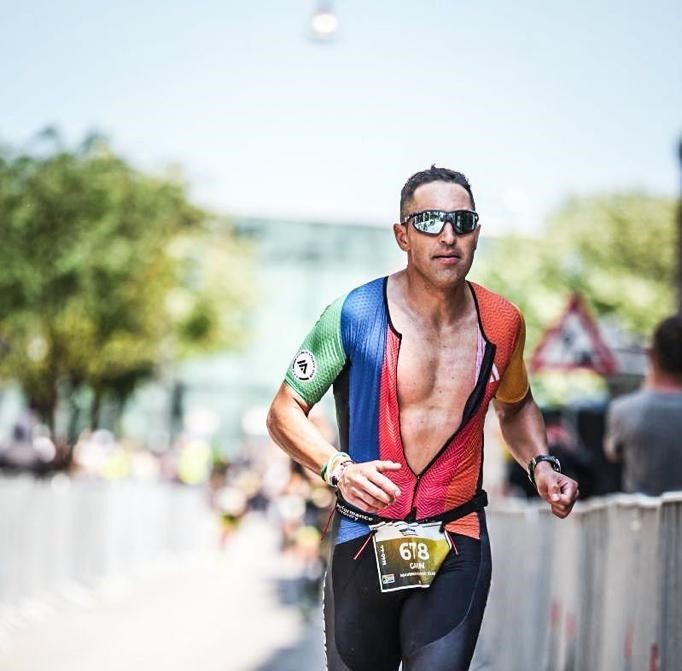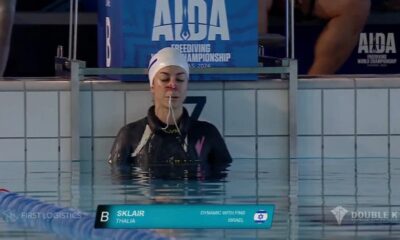
Sport

‘Never give up,’ says top Ironman athlete
Gavin Mofsowitz has been competing in triathlons for almost two decades, yet when he swam, cycled, and ran the Ironman Hamburg European Championship on 4 June 2023, he never pictured himself on the podium.
But that’s where he found himself at the end of the gruelling event – placed third in his category of males aged 40 to 44. He completed the race in less than nine hours, and qualified to compete at the highly sought after Ironman World Championships for men in France later this year.
An Ironman triathlon consists of a 3.9km swim, a 180.2km bicycle ride, and a marathon 42.2km run completed in that order, with a total of 226.3km. It’s widely considered one of the most difficult one-day sporting events in the world. Mofsowitz has completed about 10 – he has lost count. “It’s been one hell of a journey to get here, about 16 rocky years at this craft. I’m elated, emotional, and have so much gratitude,” says Mofsowitz.
As he crossed the finish line, “I broke down and called my wife, Jodi [who was in South Africa]. I was beside myself, crying with excitement and disbelief.”
He isn’t a professional athlete, and fitting in training, races, family time, and work is an extreme balancing act in itself. A wealth manager at JBL Wealth Management, a husband, and a father to a daughter and twin boys, he has his hands full.
“I don’t really believe in balance, as when I’m all in, I’m all in, but family time is very important to me,” he says. “As for a social life, I don’t have one other than training with my training friends.”
Mofsowitz grew up in Bloemfontein, attended Grey College, and is 39 years old, turning 40 this year, which is why he competed in that category. “I moved to Johannesburg after my honours degree at the University of the Free State about 17 years ago,” he says. “Having always been sporty at school, I wanted to take part in endurance sports and started out doing half-marathons.
“This resulted in doing shorter-course triathlons and eventually half and full Ironman races. Having found much success in the short course, the full Ironman became the ultimate endurance goal. I’ve been doing long-course Ironman racing for the past 15 years.”
His best result was in 2015, at Ironman Western Australia, where he came 23rd overall and was able to run a 3:01 marathon. “My coach and mentor at that time was the legendary Mark Sack, who continues to play a pivotal role in my triathlon career,” he says.
“Having a young family made training for these races exceptionally difficult, and I focused mainly on being competitive in the shorter-course races,” he says. “After tearing my Achilles tendon at Ironman South Africa in 2018, I feared I would never be able to compete at the same level. Maintaining strength training is vital. Lots of rehab work on the weakened Achilles allowed me to continue to push the limits for the longer runs and bike rides which are required to get back into long-course racing form.”
“The possibility of a sub-nine-hour-Ironman time was always on my mind, and fuelled my desire to do another Ironman,” he says. “The lead-up to an Ironman is physically and mentally demanding. Waking up at 04:30 to run, swim, and bike is draining; and then following this up with an evening session after work makes for a long and tiring day – especially when still having to help with homework and the usual family responsibilities.
“Competing against world-best age groups requires discipline, dedication, time management, and knowing when to back off so that the body doesn’t cave in,” he says. “It’s hard to find balance when training for a full Ironman. Something is invariably sacrificed – less training or less family – it isn’t easy.”
But, “with a solid endurance base built up over the years – which is key to any demanding sport – I felt that with a six-month focus, I could get into some really good form and possibly tick the sub-nine-hour box.”
His coach, Travis Johnson of Mavericks Academy, “who knows how busy life is with a young family and the juggling of work and training”, put together an action plan with various builds and short-course races leading up to Hamburg, says Mofsowitz. “The year started off with a 2:55 Cape Peninsula Marathon; third place in my age group at Ironman 70.3 Port Elizabeth; and a first place in my age group and fifth overall at the Sun City Ultra Triathlon just about four weeks prior to Hamburg. I knew the form was there as the training had been consistent, and the body was feeling good.”
On the day, everything fell into place. “After having a good swim in the iconic Alster Lake, I was competitively well-placed on the bike route which lends itself to a fast bike split. A very bad bike accident involving a cyclist and the motorbike pilot carrying the cameraman forced us to re-route that section on foot, which slowed us all down.
“Onto the run, I knew I needed to run close to a three-hour marathon to have any chance at a top position. The run really hurts, especially as it gets longer. Travis was giving me splits [telling him where he was coming in the field] on the run route, and I knew I needed to hold a very fast pace to have any chance of a podium finish.
“I felt great out of transition, and quickly settled into some good rhythm but as with any marathon, you know the ‘wall’ is coming and it usually happens from about 30km. I knew I was moving up places, and I needed to vasbyt for the last 12km, which is where you really need to dig deep.
“The crowds were fantastic. Coming home with a dead flat three-hour marathon resulted in an emotionally-fuelled third-place finish in my age category, a sub-nine-hour overall time of 8:54, and a world championship slot.”
Where to from here? “The dream is still the world champs race in Kona, Hawaii. I’ve qualified previously, but due to family commitments and work, I’ve never gone. But it could happen next year, please G-d.” The original Ironman triathlon was held there, and the world championship has been held there annually since 1978.
His advice to others wanting to follow in his footsteps is, “Be consistent in your training year after year. There are no short cuts. Stay focused, learn from your mistakes, and keep challenging yourself. The road to success is never linear. The true challenge is how to overcome challenges and disappointments. Never give up!”











Ray Kibur
June 8, 2023 at 1:44 pm
Well done Gavin you can justifiably be proud of your achievments.